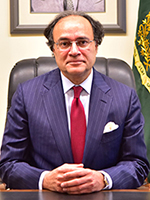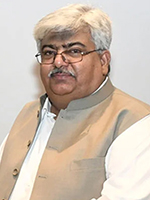MESSAGES

Prime Minister Muhammad Shehbaz Sharif on the occasion of International Customs Day 2025
Pakistan joins the global community in celebrating International Customs Day. We reaffirm Pakistan’s steadfast commitment to fostering collaboration with our international trade partners. I appreciate the members of the World Customs Organization (WCO) for their unwavering dedication and commitment to the global trade community.
This year’s theme, “Customs Delivering on its Commitment to Efficiency, Security, and Prosperity,” resonates aptly with Pakistan’s own vision of ensuring the efficient delivery of services while maintaining a vigilant approach to provide a secure trading environment. We stand committed to advancing prosperity and progress through robust trade facilitation and strengthened border security. Our premier institution, the Pakistan Customs, remains dedicated to embracing the WCO’s call for seamless trade processes, enhanced border protection, and adaptability within the global supply chain.
I am delighted to note that, under my direction, Pakistan Customs has recently implemented the Faceless Customs Assessment (FCA) System, which is aimed at reducing clearance time and inducing efficiency and transparency in Customs assessments. I am confident that this system will not only streamline the clearance process but also enhance the overall efficiency and reliability of Pakistan’s Customs operations, contributing to a more secure and transparent trade environment.
Pakistan’s economic landscape presents both challenges and opportunities. Our focus on addressing critical issues such as increasing the tax-to-GDP ratio, combating the menace of smuggling and illicit trade, and, above all, expanding the tax base will be pivotal in putting Pakistan on the path of sustainable economic growth. Moreover, maintaining heightened security measures at our borders and other sensitive locations will safeguard our national interests and ensure a secure environment for international trade.
As we commemorate International Customs Day 2025, I extend my deepest appreciation to Pakistan Customs for their continued efforts towards achieving the objectives we have set for ourselves in our economic reform agenda. To the global community, I affirm that Pakistan is fully committed to playing a pivotal role in ensuring the security of global trade and is well-prepared to meet the challenges ahead.

Minister for Finance & Revenue, Senator Muhammad Aurangzeb on the Occasion of International Customs Day 2025
On the occasion of International Customs Day, celebrated annually on January 26th under the auspices of the World Customs Organization (WCO), I extend my warm greetings to the global customs community. This year’s theme, “Customs Delivering on its Commitment to Efficiency, Security, and Prosperity,” reflects the critical role that customs authorities play in facilitating global trade while ensuring the security of borders and national interests.
Pakistan is fully aligned with this theme and remains deeply committed to creating an efficient trade environment that not only facilitates commerce but also enhances security measures to protect national interests. This commitment requires a forward-thinking approach, balancing trade facilitation with the enforcement of laws and regulations in a manner that supports both economic growth and national security.
In today’s rapidly evolving global trade environment, it is essential to strike a judicious balance between efficiency and security in order to foster strong, lasting relationships with all stakeholders. The current government has placed the transformation of the Federal Board of Revenue (FBR) at the heart of its economic stabilization and revival efforts. As part of this, a comprehensive plan to improve Customs systems and procedures is being actively implemented. This transformation will contribute significantly to the economic development of Pakistan and is expected to drive the nation toward greater prosperity.
Looking ahead, Pakistan Customs must continue to evolve and innovate in response to the changing dynamics of global trade. I am confident that Pakistan Customs, with its dedicated professionals and forward-looking approach, will not only meet these challenges but will continue to be a source of national pride.

Honourable Chairman FBR’s
On the occasion of International Customs Day 2025, Pakistan proudly stands at the crossroads of a digital transformation, embracing the World Customs Organization’s theme: Customs Delivering on its Commitment to Efficiency, Security, and Prosperity.
Through FBR’s Transformation Plan and guided by a vision of reform, the true spirit of this year’s theme is being achieved, breathing new life into customs operations. By leveraging cutting-edge technologies and innovative practices, Pakistan Customs is creating a robust framework that ensures seamless trade flows, fortified border security, and fertile grounds for economic prosperity.
Through digital initiatives and streamlined procedures, Pakistan Customs is dedicated to reducing trade barriers, accelerating the movement of goods, and creating a business environment that is efficient, competitive, and secure.
A prime example of this digitization is the Faceless Assessment initiative, which has been launched at one of Karachi’s busiest ports and has put an end to unnecessary paperwork, hidden costs, and arbitrary delays.
Coupled with other initiatives, including a Cargo Tracking System and Digital Enforcement Stations, FBR’s Transformation Plan demonstrates Pakistan’s commitment to the World Customs Organization’s guidelines, enhancing its standing in the international community and bringing its customs operations at par with other advanced customs administrations around the world.
As we celebrate International Customs Day 2025, I would like to commend all the men and women of Pakistan Customs who have performed their duties with exemplary dedication, integrity, and professionalism, without succumbing to the temptations around their work.
Their perseverance and commitment ensure that Pakistan’s economy is well-positioned to take advantage of the opportunities in global trade while safeguarding the security and prosperity of our nation.
Together, we will build a future where Pakistan is not only a vital player in the global trade network but also a shining example of how innovation and digitization can drive national and international prosperity.
Member (Customs Operations), FBR’s
Pakistan is commemorating International Customs Day 2025 as part of the global customs community.
The World Customs Organization (WCO) has set the theme “Customs Delivering on its Commitment to Efficiency, Security and Prosperity” for the year 2025.
This year’s theme underscores the indispensable role played by customs administrations in today’s interconnected world.
It serves as a roadmap for customs authorities and calls for a proactive approach to ensure global trade security in order to safeguard international and national interests.
In an era marked by rapid technological advancements, the global customs community needs to adeptly navigate the intricate balance between efficiency and security to ensure progress and prosperity.
Our commitment to excellence demands that we provide efficient service delivery to all stakeholders while at the same time implementing stringent security measures to ensure trade transparency and national security.
Customs administrations worldwide are facing multifaceted challenges, ranging from the relentless pace of digital transformation, emerging cross-border threats, and complexities in the geopolitical arena. In this backdrop, the Federal Board of Revenue (FBR) Transformation Plan is a prime example of how technologies like electronic data exchange and risk management systems can be applied for the provision of an efficient and secure trade environment.
Through automated clearance systems, we’re streamlining customs processes to help businesses thrive and make trade easier for everyone.
Today is a special day to recognize the essential role played by customs administrations in helping to keep our borders safe. I extend my gratitude to the global customs fraternity for their support and reaffirm that Pakistan Customs will continue to deliver on its commitment to efficiency, security, and prosperity.

Chief Collector of Customs Enforcement Islamabad (Mr. Basit Maqsood Abbasi) on International Customs Day 2025
As we observe International Customs Day on January 26, 2025, we take pride in reflecting on the vital role of customs administrations worldwide. This year’s theme, “Customs Delivering on its Commitment to Efficiency, Security, and Prosperity,” set by the World Customs Organization (WCO), highlights the essential contributions of customs authorities to global trade, national security, and economic advancement.
Customs administrations are central to the smooth movement of goods across borders while maintaining security and promoting economic stability. Our responsibilities are diverse, ranging from facilitating trade and enforcing regulations to generating revenue and promoting legitimate business activity. These efforts collectively underpin national development and international cooperation.
A key priority for customs is efficiency. In today’s dynamic global economy, streamlining processes is vital to ensure smooth trade operations. By embracing modern technologies like artificial intelligence, block-chain, and automated systems, we are transforming customs procedures. These advancements reduce processing times, enhance transparency, and create a predictable trading environment, enabling businesses of all sizes to flourish.
Security remains fundamental to our mission. Customs plays a pivotal role in protecting nations from transnational threats such as smuggling, illicit trade, and organized crime. By leveraging intelligence-driven risk management systems, inter-agency collaboration, and strengthening international partnerships, we strive to safeguard borders, protect communities, and uphold the rule of law.
Ultimately, all these efforts contribute to economic prosperity. Customs is not only a regulatory authority but also an engine for growth, promoting legitimate trade and ensuring the fair collection of revenue. Through our efforts, we stimulate industrial growth, attract investment, and enhance regional connectivity, paving the way for sustainable development and national progress.
On this International Customs Day, I extend my heartfelt gratitude to the dedicated customs officers and staff who uphold these values daily. Your unwavering commitment and professionalism are the foundation of our success. I also thank our stakeholders—businesses, trade associations, and partner organizations—for their cooperation and trust, which are critical to achieving our shared objectives.
Let us take this opportunity to reaffirm our dedication to innovation, collaboration, and service excellence. Together, we can continue to build a resilient, efficient, and secure customs system that not only supports national priorities but also contributes to global harmony and prosperity.

Collector of Customs Enforcement Karachi (Mr. Moin Ahmad Wani) on International Customs Day 2025
As we mark International Customs Day on January 26, 2025, it is time to reflect on the critical role Customs plays in global trade and national development. This year’s theme, “Customs Delivering on its Commitment to Efficiency, Security, and Prosperity,” highlights Customs’ responsibility to ensuring smooth trade operations while safeguarding the nation’s interests and promoting economic progress.
Customs is the backbone of international trade, facilitating legitimate business while protecting societies from unlawful activities. Our mission is multifaceted: we support the growth of trade and ensure fair revenue collection while simultaneously safeguarding our borders. These sometimes conflicting responsibilities require continuous innovation, collaboration and dedication to excellence.
Streamlining trade operations is one of our key goals. By embracing advanced technologies and refining Customs processes, we aim to simplify Customs procedures, reduce clearance times, and create a conducive environment for both local and international businesses. Enhancing efficiency benefits trade and consequently strengthens the economy.
Another cornerstone of our role is security. Customs serves as the first line of defense against threats posed by smuggling, illicit trade, and other unlawful activities. Through the use of data-driven strategies, intelligence systems, and inter-agency cooperation, we ensure the safety of our borders and protect our communities from harm.
At the heart of all these efforts is our commitment to boosting economic prosperity. By enabling the smooth flow of goods, promoting legal trade practices, and supporting industry, we contribute significantly to the nation’s development. Customs also plays an important role in connecting local markets to global supply chains, driving growth and innovation.
On this special day, I wish to acknowledge the tireless efforts of Pakistan Customs officers and staff, whose dedication and professionalism are instrumental in achieving these goals.
As we move forward, let us renew our commitment to serving with integrity, embracing innovation, and working together to build a secure and prosperous future for all. With a collective effort, Customs can continue to be a cornerstone of economic resilience and national progress.
Wishing you all a meaningful Customs day!
ARTICLES

Director Customs Reforms and Automation
(Digitalization) Karachi
Customs Modernization for Efficiency, Security and Prosperity
Globally, mandate of customs comprises of revenue collection, trade facilitation, security and protection of society. Preference of mandate changes with development goals of each country and due to operational environment. In Pakistan, the operational environment still stresses customs to vouch more for revenue collection to fulfill the unbridged revenue gap which is critical for country. We are still chasing hard to increase the tax to GDP ratio to equitable levels. Amid of this operational environment it becomes bit challenging for customs to strike a balance between trade facilitation and strict compliance. The operational policy oscillates between increasing facilitation measures to stringent compliance goals.
It goes without saying that it is the trade and industry (business) which brings prosperity to a country. The World Bank in Business Ready report 2024, states that, “Today, the private sector generates about 90 percent of jobs, 75 percent of investment, more than 70 percent of output, and more than 80 percent of government revenues in developing economies”. The report further writes that “A vibrant private sector is central to efforts to end extreme poverty and boost shared prosperity on a liveable planet. When it functions well, the private sector sparks innovation and entrepreneurship. It can unlock economic opportunities for people who need them the most. It can drive more efficient and sustainable use of natural resources.”
The above economic strategy as narrated by the World Bank has impacted a large number of countries to bring their people out of poverty lines, collect more revenues for the state and create prosperity for the nation. Customs all over the world with its core mandate of revenue collection, trade facilitation, security and protection of society play a critical function in creating a business friendly operational environment by reducing the cost of doing business in country, making regulatory compliance easier and user friendly, and increasing the confidence of trade and industry for developing their business in country. This results increase in trade volumes, more tax collection, creation of additional jobs, innovation and prosperity for a nation.
To achieve the aforementioned objectives, Pakistan Customs has been continuously on the ride of reforms and automation process improving its performance by leveraging the modern technologies. The first giant step was taken in 2006 where Pakistan Automated Computerized Clearance System known as PaCCS was implemented by incorporation the international best practices and the WCO standards enshrined in the Revised Kyoto Convention a bible of customs modernization. The progress did not stop there. In 2011, Pakistan Customs indigenously developed Web Based Once Customs (WeBOC) system for speedy clearance and shifting the front line checks to post clearance audit of cleared consignments.
First time, in 2018-20 with the help of the World Bank and the World Customs Organization experts the compliance management system known as Risk Management System (RMS) was augmented with the tools of Artificial Intelligence (AI) and Machine Learning (ML). The technological interventions produced significant benefits for trade and industry by reducing the dwell time of clearance of goods at ports and elimination of human interaction in clearance of consignments. The tools simultaneously strengthened the customs administration by achieving higher level of compliance in detection of evasion of duty and taxes by identifying the non-compliant traders and assisting for selective physical inspections which resulted additional revenues for state and stoppage of contraband item in country.
Pakistan Customs introduced a number of new modules in a bid for further modernization customs processes to reduce dwell time and increase facilitation. The modules of pre arrival clearance and virtual assessment were implemented where traders were facilitated for clearance of their consignments even before arrival of ships at port so as to achieve the zero inventory management practices by industry. By use of technology a module of computerized assessment system was introduced to further eliminate the human interaction and making the process efficient. By implementation of RMS based clearances, Blue channel for scanning to reduce red channel clearances, Authorized Economic Operator program, E- Commerce module, Smart examination for on sight examination reports and other technology based interventions significantly enhanced the efficiency in dwell time reducing it from 3 – 4 days to 24 hours where 74 % of thorough output of import and export containers is cleared less than 24 hours. Very recently the intervention of Faceless Assessment System is an effort in the same direction to make the system more transparent and efficient.
Recently, the WCO has launched “the Smart Customs Project” by first domestic study mission on AI/ML experience in China. Mr. Lin Wei, Director General of China Customs the Department of Risk Management, highlighted the transformative role of digitalization and intelligent Customs systems in enhancing Customs performance and the security and efficiency of global trade. The project covers to identify high-risk enterprises through a visualization of relationship networks, Smart NII Image Analysis, Intelligent Document Examination, Smart Port Development and AI Applications in the Single Window Environment.
The current strategic road map of government is focused on the key components such as People, Process and Technology. This approach is going to unfold the power of technology used for revenue collection, trade facilitation and protection of society. The tangible benefits of AI integration, such as greater risk management accuracy, accelerated clearance times, and improved consistency in decision-making can be achieved for meeting the commitment of international customs day 2025 i.e. Efficiency, Security and Prosperity. This, however, requires ongoing investments in specialized expertise, advanced computational resources, robust data analytics infrastructure, well-defined policies and commitment by the leadership to transform the current operational environment to achieve the desired results.

Pakistan Customs Delivering Efficiency, Security and Prosperity
Pakistan Customs is one of the pivotal national institutions. It plays key critical role in economic development through revenue generation and implementation of import, export and industrialization policies. Pakistan Customs is also a frontline force at borders to ensure public and environmental safety by controlling cross border trade in hazardous, counterfeit, infested goods and substance. Pakistan Customs as also one of the national institutions tasked with responsibilities to contribute in national security by combating smuggling, conducting anti narcotics operations and investigating and prosecuting trade based money laundering and terrorist financing activities.
This years’ International Customs Day (ICD) theme of “Customs Delivering on its Commitment to Efficiency, Security and Prosperity” is no doubt a true manifestation of what Pakistan Customs does and had to further improve and contribute more in efficiency, security and prosperity in sustainable manner.
World Customs Organization (WCO) by highlighting current theme reminds us of importance of Customs Organizations. By Efficiency, WCO suggests that Customs authorities around the world can improve efficiency for trade facilitation by modernizing customs procedures through digitization, data exchange mechanisms and Single Window Systems. WCO recommends data driven operations and use of technologies for better decision making and resource utilization with the use of robust and dynamic Risk Management Systems (RMS), Data Analytics, Artificial Intelligence and Machine Learning. Efficiency can also be further improved, WCO proposes, by leveraging non intrusive inspection tools and other equipment like scanners, drones, robots and portable detection and Inspection devices. WCO also recommends implementation of obligations under Revised Kyoto Convention (RKC) with respect to performance measurement, improving communication tools and building partnerships with Public and private entities.
Pakistan Customs is already well ahead of many national institutions and comparable peers in the region in the area of Efficiency. Almost all core Customs Business Processes are already digitized for last many year through erstwhile PACCS (Pakistan Automated Computerized Customs System) and presently implemented through much improved RMS based WeBOC (Web Based One Customs). WeBOC is currently operational at all Customs Stations (Sea Ports, Airports, Border Stations and Dry Ports) around the country. Pakistan Single Window is another milestone in the cap of Pakistan Customs for its successful role out coordinating and connecting all stake holders on single platform to facilitate international trade in seamless manner. Pakistan Customs has also signed Data Exchange Agreements with number of trade partners in the region. Pakistan is also compliant with RKC with respect to performance indicators, communication interfaces and partnership with Public and private partners. The only area where Pakistan Customs need to improve on is to use of Data Analytics, Artificial Intelligence and Machine Learning, efficient use and utilization of scanners, drones, robots and portable detection and Inspection devices. By leveraging these technologies and tools Pakistan Customs shall definitely further improve its efficiency.
On Security front, WCO emphasizes role of Customs by strengthening Supply Chain Security, Countering the Movement of Illicit goods (arms, chemical precursors, strategic goods and radioactive materials), combating money laundering (trade based money laundering and terrorist financing) and enhancing crisis (natural disasters, environmental and health emergencies, cyber security) preparedness.
Pakistan Customs is well aware of its role on Security side and had been in fore front in combating and controlling movement of illicit goods, combating money laundering and fully prepared in times of crises. Pakistan Customs is a lead agency in controlling smuggling along with other Law Enforcement Agencies. Mechanism for control of trade in chemical precursors is already in place through System Based Controls under WeBOC RMS and physical control through Port Control Units and country wide network of Enforcement Units. Pakistan Customs through its Intelligence and Investigation Wing actively investigates and prosecutes cases of trade based money laundering and terrorist financing. Pakistan Customs coordinated with other important institutions of national importance to ensure compliance to FATF. Role of Pakistan Customs and its preparedness in times of crises like in COVID-19, Earthquakes and Floods is well recognized. Pakistan Customs has also put in place National Nuclear Detection Architecture (NNDA) across the country at sea ports, airports and border stations to regulate and control trade in nuclear materials.
Role of Pakistan Customs in national prosperity is well recognized and very critical. It collects almost forty five percent of total tax revenue of Federal Board of Revenue, Pakistan.
It implements through imports and exports regulations various tax incentives, duty remissions on imports, Export Facilitation Schemes 2021, physical surveys, Special and Export Processing Zones, Transit and Trans-shipment Trade to promote investment and industrialization in the country. WCO, accordingly, emphasizes upon Customs Authorities to foster innovation and entrepreneurship, ensuring revenue collection and management, promoting sustainable economic development and developing inclusive policies and tools. Pakistan Customs, conscious of its national and international responsibilities, fully and professionally delivers and contributes in economic development and national security of Pakistan.

Director, NNDA Customs
Islamabad
Importance of Effective Communication for Customs Workforce
Communication has been essential to human survival. The history of communication can be traced back to the origin of speech, which is believed to have begun approximately 100,000 years ago. Early humans likely communicated through a combination of vocal sounds, gestures, and body language. The limitations of spoken language led to the development of symbolic forms of communication. The oldest known symbols for communication are cave paintings, with the earliest examples dating back around 30,000 years ago. These paintings served as a means to convey information and express ideas visually.
Following cave paintings, petroglyphs emerged as another significant advancement in communication technology. Petroglyphs are rock carvings made by pecking directly into stone surfaces. This form of communication appeared around 10,000 to 12,000 years ago during the Neolithic period followed by pictograms and ideograms.
The advent of writing marked one of the most transformative developments in human communication history. The earliest known writing systems were logographic in nature and emerged around 3300 BCE during the Bronze Age in regions like Mesopotamia and Egypt. These systems utilized symbols derived from earlier pictographic and ideographic forms but allowed for more precise recording of language. By about 1700 BCE, alphabetic systems began to emerge. Over centuries, various cultures developed their own writing systems, whereas the modern English alphabet was adopted in its current form during the 16th century AD.
In contemporary times, advancements in technology has revolutionized how humans communicate. From printing presses in the Renaissance period to telecommunication technologies and the Internet today, each innovation has expanded our ability to share information across vast distances instantaneously. Overall, human communication has evolved from primitive vocalizations and symbolic representations to electronic messages that are transmitted within seconds.
The regular polishing of communication skills is most important for all those working in law enforcement agencies. In case of customs officers, effective communication directly impacts the efficiency and effectiveness of their operations. Importers, exporters, agents and other stakeholders require an updated knowledge on customs laws and regulations that must be communicated to them clearly. This clarity helps ensure that all parties understand what is expected of them, reducing the likelihood of errors or misunderstandings that could lead to delays or compliance issues.
Good communication fosters a smoother trade process. When customs officials can effectively convey information regarding tariffs, duties, and documentation requirements, it enables businesses to comply more easily with regulations. This facilitation not only benefits individual businesses but also enhances overall trade efficiency. Customs officers should also stay updated on changing regulations and best practices within international trade to enhance their knowledge of complex trade environments. An ideal customs officer works locally but thinks globally.
Customs officers often encounter disputes or conflicts related to shipments. Effective communication skills are crucial for negotiating and resolving these issues amicably. By articulating concerns clearly and listening to the perspectives of importers or exporters, customs officials can mediate disputes more effectively, leading to quicker resolutions.
Listening is an important part of communication. Open lines of communication help build relationships that can lead to better cooperation during inspections or audits. When stakeholders feel they can communicate their issues openly to the concerned officers then, it encourages compliance and transparency. Establishing trust between customs officers and stakeholders in the supply chain is essential for smooth operations.
Communication also plays a critical role in risk management within customs operations. By sharing intelligence about potential risks—such as smuggling or fraud, customs officials can work collaboratively with other agencies and stakeholders to mitigate these risks proactively. Customs officials have to deal with multiple other agencies on most of the key point of entries like at the airports etc. There are around more than 20 law enforcement agencies working at the airports, each one having its own mandate. Without effective communication skills, surviving at such a work place can be extremely challenging.
Customs processes are governed by strict timelines. One measure of efficiency is the reduction in dwell time. Prompt redress of all issues is of utmost importance in supply chain management. Moreover, time-sensitive shipments are often critical for businesses that rely on just-in-time inventory systems or seasonal sales cycles. Delays caused by miscommunication can disrupt supply chains significantly, leading to stock outs or missed sales opportunities. Therefore, maintaining clear and timely communication is vital for operational efficiency.
The evolution of clearance systems by Pakistan Customs starting from PACCS, One Customs, WeBOC and PSW speak volumes of our commitment to continuous improvement. The aim is to enable and improve communication through technological platforms. Quite recently a Central Appraising Unit (CAU) has been established at South Asia Pakistan Terminal (SAPT), Karachi which is an isolated and sanitized workspace where Appraising Officers have no contact with outsiders during working hours. Consignments arriving at all terminals of Karachi Ports and Port Muhammad Bin Qasim (PMBQ) are processed through the CAU. It is expected that in the next phase, the FCA shall be rolled out to other customs stations in the country.
The primary objective of this initiative is to minimize human interaction with the traders and to create a faceless customs assessment model that improves transparency and standardizes assessments throughout the country. This system will leverage digital tools to enhance customs operations and compliance. Key objectives of Faceless Assessment include:
- Anonymity in assessment
- Speedier Customs clearance
- Uniformity of assessment
Effective communication requires a deep understanding of people and processes. Understanding people makes us realise that:
“We are all equal in the fact that we are all different. We are all the same in the fact that we will never be the same. We are united by the reality that all colours and all cultures are distinct and individual. We are harmonious in the reality that we are all held to this earth by the same gravity. We don’t share blood, but we share the air that keeps us alive” C. Joybell.
Understanding of processes enable us to keep improving those, in order to become a more dynamic, transparent and efficient organisation.

Preventive Detention of Smugglers
The 2025 theme for International Customs Day set forth by the World Customs Organization (WCO), “Customs Delivering on Efficiency, Security, and Prosperity,” underscores the indispensable role Customs organizations play in fostering global trade while ensuring safety and economic growth.
This year’s theme zeroes in on the imperative for optimized customs procedures to streamline trade (efficiency), ramp up security by curbing illegal activities and protecting borders (security), and foster economic growth by cultivating smooth and fair trade flows (prosperity).
Security in customs operations constitutes the linchpin of safe and reliable trade, guaranteeing goods are on the move without falling into the hands of smugglers, counterfeiters, or the traffickers of hazardous commodities.
Pakistan Customs harnesses sophisticated risk assessment systems, rigorous physical inspections, and intelligence-sharing networks at seaports, border stations, and airports to protect national borders.
Smuggling, however, persists through little-known routes along the international borders of Iran and Afghanistan. To clamp down on smuggling, FBR has put in place a robust anti-smuggling strategy, part of its Transformation Plan, focused on fortifying inland check-posts.
As a result, the flow of smuggled goods from Baluchistan to other parts of the country has been effectively choked off, with a notable reduction seen in the quantum of smuggling during the current fiscal year.
FBR’s anti-smuggling efforts can be taken up a notch with the implementation of preventive detention for smugglers. This unconventional measure would act as a powerful deterrent, offering a cost-effective tool to rein in the pernicious activities of habitual smugglers.
The Prevention of Smuggling Act 1977, in its Chapter 2, lays down the provisions regarding preventive detention, which authorizes both the Federal and Provincial Governments to detain an individual if they suspect that the person is likely to indulge in smuggling.
The detention order is passed in writing by the Federal/Provincial Government and directed towards a police officer or any other person who is authorized to arrest the suspected person.
If a police officer receives credible information that a person, subject to an order of arrest and detention, is within their jurisdiction, the officer may arrest the person without a warrant.
The arrested individual will then be placed in custody as outlined in sub-section (5) of section 3. Alternatively, if a requisition is made by the police officer or any other person to whom the detention order has been addressed, the arrested person shall be handed over to the custody of that police officer or individual for execution of the order.
In order to ensure that preventive detention aligns with the right to fair trial and due process under Article 10-A of the Constitution and to provide safeguards to every person against arbitrary arrest or detention under Article 10 of the Constitution, PSA 1977 has laid down the procedure of preventive detention in accordance with Article 10 of the Constitution. For instance, the PSA requires the government to provide the detained person with the grounds for their detention within fifteen (15) days, as per Section 3(6), in line with Article 10(5) of the Constitution. It also grants the detained person the right to make a representation against the detention order under Section 3(6), and provides for a review of the detention order by an independent Review Board under Section 5 of the PSA, in accordance with Article 10(4) of the Constitution.
The Customs Act, 1969 and the Prevention of Smuggling Act, 1977 need to be aligned and harmonized to ensure consistency between the two statutes. First, the definition of smuggling under Clause (f) of Section 2(1) of the Prevention of Smuggling Act, 1977 may be amended by omitting the words ‘but, in chapter II, relates only to the taking of goods out of Pakistan’. This change will enable the provisions of Chapter II to apply to all kinds of smuggling, whether goods are being taken out of, or brought into, Pakistan. Second, the powers of preventive detention under Chapter II of the Prevention of Smuggling Act, 1977 are required to be delegated to the Collectors Customs Enforcement within their respective jurisdictions by amending Section 7 of the Act. This delegation of power by the Federal Government to field officers (Collectors Enforcement) will activate the instrument of preventive detention and is expected to create credible deterrence against smugglers.
Article 10 (4) of the Constitution provides that those, “acting in a manner prejudicial to the integrity, security or defense of Pakistan or any part thereof, or external affairs of Pakistan, or public order, or the maintenance of supplies or services” may be preventively detained. Section 5(4) of the Prevention of Smuggling Act, 1977 has declared smuggling an anti-national activity for the purpose of the proviso to Clause (7) of Article 10 of the 1973 Constitution. The implication is obvious: preventive detention of suspected smugglers can last for more than 12 months.
Preventive detention is an exceptional measure employed in emergency situations when conventional law enforcement mechanisms are deemed inadequate to frustrate the nefarious activities of smugglers. The powers of preventive detention have been vested in Deputy Commissioners of Districts via the Maintenance of Public Order Ordinance 1960 of respective Provinces. These powers are invoked by DCs in extraordinary circumstances. Interestingly, smuggling has been defined as an act prejudicial to the maintenance of public order under Section 3 (ii) of the Punjab Maintenance of Public Order Ordinance 1960, thereby empowering Deputy Commissioners of Districts to detain suspected smugglers under Section 3 of the MPO Ordinance, 1960 for the offence of smuggling. The anomaly in the current scheme of laws is patently awkward: the Deputy Commissioner of a District, a BS-18/19 officer, can detain a suspect person for various offences including the offence of smuggling for a period of three months, but the Collector Customs Enforcement (BS-20) of Pakistan Customs—premier anti-smuggling agency of the country—cannot detain such suspected smugglers.
The Conservation of Foreign Exchange and Prevention of Smuggling Act 1974 (COFEPOSA Act) in India is identical to the Prevention of Smuggling Act, 1977 in Pakistan. Unlike PSA, 1977 in Pakistan, COFEPOSA Act is fully operational and updated. Under the COFEPOSA Act, both central and state governments in India are empowered to detain a person, including a foreigner, if it is satisfied that it is necessary to do so with a view to preventing him from smuggling goods, abetting the smuggling of goods, engaging in transporting or concealing or keeping smuggled goods, or harbouring persons engaged in smuggling goods or abetting the smuggling of goods.
The primary legislation governing preventive detention in Bangladesh is the Special Powers Act, 1974. The District Magistrate and Additional District Magistrate are empowered to make detention orders under Section 3(2) of the Special Powers Act, 1974 on various grounds, including actions which prejudice the maintenance of supplies and services essential to the community or which prejudice the economic or financial interests of the State.
Preventive detention acts as a powerful deterrent for smugglers by restricting their movement across the country. The imminent threat of detention discourages smugglers from carrying out illegal activities as it entails immediate consequences. It ensures seamless enforcement as the detaining authority can issue a detention order and delegate its execution to Customs, police, or any other authorized officer. The detention process sidesteps the delays typically associated with traditional criminal proceedings. Unlike protracted criminal cases entangled in complex litigation, preventive detention provides a quicker, more cost-effective alternative. It skips over the need for formal trials, making it a more efficient solution for dealing with smuggling. Preventive detention tightens the grip on habitual smugglers, leaving them with fewer avenues to escape through the judicial system. Due to its stringent nature, smugglers are unlikely to gain relief from the courts, ensuring their prolonged detention. Given the limited resources of Pakistan Customs, preventive detention is a resource-efficient measure. Once the detention order is handed down by the concerned Collector Customs Enforcement, it can be carried out by police officers, who have a nationwide presence, thus relieving Customs authorities of some of their operational burden.

Collectorate of Customs Airports, Karachi
Pakistan committed to WCO Theme 2025 for a leap forward
The World Customs Organization (WCO) was established on January 26 1952, with the core purpose to maximize the effectiveness and efficiency of 186 representative Customs administrations which contribute to 98% of global trade approximately. WCO, as an Organization specialized in Customs matters, remains fit for this purpose in an increasingly complex trade environment through a set of indicators and concrete activities to respond to Customs administrations’ needs in trade facilitation, revenue collection, protection of society and organizational development.
With this forward-looking approach, the WCO’s theme for 2025 is “Customs Delivering on its Commitment to Efficiency, Security and Prosperity”. This theme underscores the pivotal role that customs administrations play in facilitating trade, ensuring security, and fostering economic growth It is a call to WCO Members to reassess their commitment to securing and facilitating global trade, protecting revenue collection, building Customs-business partnerships and delivering capacity building in support of Customs reforms and modernization. Pakistan also joins the global community in celebrating World Customs Day 2025. The Federal Board of Revenue (FBR) and Pakistan Customs have embarked on several transformative initiatives to align with this global vision, demonstrating a steadfast commitment to efficiency, security, and prosperity. The ongoing transformation projects, supported by technological advancements and international collaborations, elevate Pakistan’s capacity to meet the complex challenges of global trade.
Pakistan Customs has been at the forefront of digital innovation, aiming to streamline processes and reduce bureaucratic hurdles. A landmark initiative in this regard is the Pakistan Single Window (PSW), which seeks to digitize Pakistan’s cross-border trade, minimizing the reliance on paper-based procedures. By allowing international traders to submit information through a single digital platform, the PSW simplifies the acquisition of necessary documents, permits, and clearances, thereby expediting import and export processes. Complementing the PSW, Pakistan Customs has implemented the Faceless Assessment System (FAS). Introduced in December 2024, the FAS has revolutionized customs assessments by eliminating direct contact between customs officers and traders. This system aims to streamline customs clearance by minimizing human interaction, thereby reducing clearance times and enhancing transparency The modernization efforts, including the digitalization of operations and the implementation of systems like the PSW and FAS, have facilitated trade, reduced costs, and improved the ease of doing business. This FAS system has resulted in enhanced operational efficiency. In its inaugural month, Pakistan Customs reported a 27% increase in revenue than the previous month. Additionally, physical examinations have decreased substantially resulting in almost half of cargo being cleared within a day, effectively decreasing dwell time and port congestion. These initiatives are aligned with Pakistan’s global obligations, such as the World Trade Organization’s Agreement on Trade Facilitation, and Pakistan’s goals of trade facilitation and regional connectivity.
In recent years, there has been a paradigm shift towards enforcement functions evolving into a major challenge with tangible targets. Pakistan Customs has focused particular attention on maintaining its expertise in core functions while exploring areas requiring further improvement. This focus ensures that Pakistan Customs not only fulfills its national mandate but also contributes to the broader objectives of the international customs community. The establishment of the National Targeting Centre (NTS) and the creation of additional Directorates and Enforcement Collectorates are vital steps toward collaborative governance.
Ensuring the security of supply chains in an era marked by complex global trade dynamics is a must. Pakistan Customs has undertaken a comprehensive transformation project funded by the World Bank to bolster its security protocols. Initiated in December 2023, it involves business process mapping with the help of international experts and learning best practices by the world’s leading customs administrations. The goals are risk management and post-clearance audit to comply strictly with all customs and trade-related laws and regulations
Pakistan Customs has also engaged its aviation carriers through the International Civil Aviation Organization (ICAO) and connected airline data through the Global Targeting and Advanced Passenger Information Systems (GTAS and API), enabling the profiling of high-risk passengers arriving or departing Pakistan. Integration with internal partners, such as the Immigration Biometrics Management System (IBMS) and Customs Data Systems (CDS), has further strengthened enforcement capabilities. The organization has promoted consultation, information sharing, and cooperation with internal and external partners. These partnerships have assisted in the identification of bottlenecks, removal of trade barriers, and ensuring that trade was facilitated.
Additionally, Pakistan Customs, s collaboration with World Bank and the Asian Development Bank under initiatives such as the Pakistan Raises Revenue Program exemplifies the external cooperation required to transform Pakistan Customs into a modern, efficient organization. Capacity building remains a cornerstone of Pakistan Customs’ strategy. Programs supported by international organizations, including the International Narcotics and Law Enforcement (INL) US Embassy, the United Nations Office on Drugs and Crime (UNODC), and the WCO’s CECAC Project, has enhanced the professional capabilities of mid-level and operational officers. These efforts ensure that customs personnel are equipped to meet emerging challenges with professionalism and efficiency. Pakistan Customs’ engagement strategies underscore the importance of adaptability and inclusivity in customs practices. These strategies include advancing customer-centric approaches and integrating artificial intelligence for more effective operations.
As Pakistan commemorates World Customs Day 2025, the nation stands at the cusp of a new era in customs administration. The initiatives undertaken by Pakistan Customs reflect a proactive approach to modernizing trade processes, enhancing security measures, and promoting economic growth. These efforts resonate with the theme of World Customs Day 2025, highlighting the critical role of customs administrations in shaping a secure and prosperous future. By embracing technology and fostering international partnerships, Pakistan is poised to enhance trade facilitation, bolster economic growth, and contribute meaningfully to the global customs community.

Technological Advancements and their Role in Anti-Smuggling Operations in Pakistan
As the world marks International Customs Day 2025, Pakistan stands at a critical juncture in its fight against smuggling—a menace that continues to undermine its economy, national security, and legitimate trade. With porous borders shared with Afghanistan, Iran, China, and India, illicit trade has flourished, causing billions in revenue losses annually. However, with the advent of modern technology, Pakistan is revolutionizing its enforcement mechanisms to combat this persistent challenge effectively.
Traditional methods of anti-smuggling enforcement have struggled to keep pace with evolving smuggling networks. The reliance on manual inspections and outdated tracking systems has not only been inefficient but has also disrupted the flow of legitimate trade. Recognizing these challenges, Pakistan is now embracing advanced technological solutions, including Artificial Intelligence (AI), block-chain, drones, satellite surveillance, and automated scanning systems to strengthen its customs operations.
One of the key initiatives in this transformation is the Federal Board of Revenue (FBR) Transformation Plan, which has introduced a comprehensive technology-enabled counter-smuggling strategy. To enhance efficiency, the Automated Cargo Tracking System (CTS) is being deployed, allowing authorities to profile and target suspicious vehicles without disrupting normal traffic flow. AI-powered CCTV cameras, Optical Character Recognition (OCR) readers, and tethered balloon systems will provide real-time monitoring and improve enforcement capabilities at these checkpoints. The integration of block-chain technology will further help ensure transparency, preventing document forgery and illicit trade manipulation.
A significant component of this strategy is the introduction of an e-Transport Bill mechanism, which will digitally document the movement of commercial goods, capturing crucial details such as consignor and consignee information, origin, and delivery destinations. This system will be accessible through a user-friendly mobile application, allowing transporters, importers, and traders to register and manage their cargo digitally. Radio-Frequency Identification (RFID) technology will complement this system by tracking shipments in real time and preventing unauthorized diversions.
To operationalize the CTS, extensive database integration with existing Pakistan Customs and Inland Revenue Service systems is being planned. This will enable authorities to differentiate between imported, transhipment, transit, and locally manufactured goods, ensuring better regulatory compliance. Additionally, collaboration with Motor Registration Authorities (MRAs) and other government agencies (OGAs) will enhance vehicle and owner profiling, making it harder for smugglers to exploit regulatory loopholes.
Given the sensitivity of trade data, cybersecurity measures, including end-to-end encryption, secure authentication, and robust data governance protocols, will be implemented to safeguard information integrity. A centralized data control room, supported by RFID readers and advanced networking infrastructure, will ensure seamless tracking and enforcement.
Despite challenges such as high costs, infrastructure deficits, and digital adoption resistance, public-private partnerships and regional cooperation can drive success. By embracing technology, Pakistan is making bold strides in disrupting smuggling networks and securing its economic future, reaffirming its commitment to innovation and trade security on International Customs Day 2025.

Pakistan Customs Enforcement and Women Representation
Every year, the World Customs Organization (WCO) announces a unique theme for International Customs Day celebrations in order to kickstart debates, discussions, and special focus on the same. This year’s theme, “Commitment to Efficiency, Security, and Prosperity” sits very well with the eminent threats facing Customs Administrations around the world. However, it is felt that gender mainstreaming in the workplace is an important driver of efficiency.
Gender mainstreaming is an important buzz word today and the WCO has also been espousing it over the past few years, actively sponsoring workshops on gender mainstreaming and equality in Customs Administrations across the world; and developing training material to assist its Member Administrations to practically implement gender equality, diversity and inclusion in Customs.
In Pakistan’s case too, recent years have seen a positive development in the form of greater recruitment of women officers in Customs service of Pakistan. Despite this, however, cultural perceptions continue to restrict the number of female officers posted in anti-smuggling and enforcement activities. This has much to do with regional dynamics (amongst other causes), as reported by the United Nations Office on Drugs and Crime (UNODC) in one of its papers from 2021 that “the percentage of female officers in law enforcement agencies in Southeast Asia is low.” Moreover, a joint study by U.N Women and Interpol for the year—— reveals an abysmal 6 percent presence of females in law enforcement agencies in Southeast Asia.
Although no specific figures are available on the exact number of females in the enforcement divisions of Pakistan Customs, however, as of 2022, collectively women constituted only 2% in law enforcement agencies of Pakistan. How-ever this has not deterred serving female officers from proving their mettle in the fields of anti-smuggling and border security. Female officers from all cadres have performed impressively in enforcement operations across the country, whether in Peshawar, Gawadar, Karachi or Multan. In spite of these performance, related issues, persistent training to women participation in Customs enforcement.
Ranging from inherent cultural perspectives to inadequate gender sensitive facilitation in the field, women are generally not fully perceived as guardians of the economic frontiers or as capable of dealing with drug-related crimes. These areas are culturally attributed to men and this perception is so ingrained in the policy makers’ minds that women in general miss out on opportunities of working in enforcement –related fields. As a scenario, if an emergency situation arises requiring immediate action through an anti-smuggling operation, the team constituted for the purpose would more likely comprise of males than females. A female officer would mostly be added only as an after-thought, most likely only in case of shortage of officers.
As in the words of Laurel Thatcher Ulrich, “Well-behaved women seldom make history”, the traditional tendencies of gender limitation seldom breed desired results and sustainable success. For effective Customs enforcement, positive societal visibility and mandate setting, it is pertinent for policy makers to aim at creating policies that are more gender inclusive especially with reference to female representation in traditionally male dominated areas of anti-smuggling and border security management.
In order to make gender mainstreaming a part of Customs, policies need to be formulated by decision makers to enable female officers to maintain a good work-life balance even when posted in operational areas. This would include the provision of flexi working hours, work from home, facilities like day-care centres at the work place etc. There must also be proper capacity building trainings for female officers working in enforcement, to bring their skills at par with their male counterparts who do receive such trainings including regular drills and weapon handling trainings. Moreover, mass awareness programs and social media campaigns can also yield needed results. New Zealand Customs Service (NZCS) is an apt case study of gender inclusivity in field work where their Inclusion and Diversity Council chalked out a five-year plan that focused on more women in leadership roles, ensuring gender neutral policies, zero tolerance for harassment, and above all flexible arrangements for effective work-life balance.
Any human resource policies framed should not encourage under-representation or intentional exclusion of women from enforcement activities; instead such policies should aim at providing a conducive environment where full potential of all genders can be realized and utilised. Pakistan Customs’ enforcement division is making its mark with its efficient system of preventing and controlling the menace of smuggling in all areas every day. However, it needs more female representation in leadership roles and field work to reap the benefits of inclusive human resource and to enable Pakistan Customs to truly commit itself to efficiency, security and prosperity.

Assistant Collector
Office of Chief Collector of Customs, Appraisement (South)
Faceless Customs – Customs Delivering on its Commitment to Efficiency, Security & Prosperity
“Customs Delivering on its Commitment to Efficiency, Security and Prosperity”-theme selected by World Customs Organization (WCO) to mark World Customs Day 2025 perfectly aligns with the newly launched Faceless Customs Assessment (FCA) System in Pakistan. The groundbreaking initiative, Faceless Customs Assessment (FCA), has been inaugurated by Prime Minister Shehbaz Sharif on January 8, 2025. This is a pivotal part of the Prime Minister’s broader initiative to transform the Federal Board of Revenue (FBR) by digitizing operations, enforcing taxation laws more efficiently, and enhancing revenue collection.
At its core, the FCA is designed to enhance the ease of doing business, curb tax evasion, and promote efficiency within customs processes. This process aligns with international trade facilitation efforts, such as the World Trade Organization’s Trade Facilitation Agreement and WCO’s Revised Kyoto Convention and Arusha Declaration, by reducing trade barriers and encouraging accountability.
The FCA system represents a paradigmatic shift in the way customs operations are conducted. Traditionally characterized by face-to-face interactions between customs officials and traders, the FCA introduces a fully automated, contactless, and paperless environment at the Central Assessment Unit (CAU). This has directly contributed to the acceleration of goods release, thus facilitating smoother trade operations.
The CAU is located at South Asia Pakistan Terminal (SAPT) and currently operates with a team of 84 customs officials, including Appraisers, Principal Appraisers, and the Quality Assurance team. The personnel are operating in a closely monitored, completely sanitized environment with rigorous surveillance and accountability mechanisms in place. The risk-based system randomly assigns tasks to the Assessment Officers, irrespective of the Collectorates, that are completed on a first-in, first-out (FIFO) basis. This approach not only ensures transparency but also mitigates the risk of undue influence or preferential treatment.
Soon after FCA rollout, the frequency of document calling and goods examination by Assessment Officers started to decline- now down by 74% and 70%, respectively, much to the relief of traders. Since its inception, the FCA has delivered remarkable improvements in customs clearance times. The system has reduced the average time for customs clearance from 108 hours to just 17 hours, a dramatic decrease that has significantly mitigated the opportunity costs and losses that businesses traditionally incurred due to prolonged delays in clearance. This reduction in manual processes has been widely appreciated by traders and stakeholders, who now experience faster processing times and fewer burdens in forms of demurrage and detention charges.
The introduction of the FCA system and the adoption of a uniform assessment process are poised to significantly reduce litigation in customs matters. By ensuring a more transparent, fair, and standardized approach to the assessment of Goods Declarations, the FCA minimizes the chances of arbitrary decisions and inconsistencies.
This being done by no means ignore the capacity building and well-being of the Assessment Officers. Thorough incentive structures have been put in place to encourage optimal performance among Appraisers, with rewards and penalties based on their output and accuracy. The system’s random assignment of Goods Declarations to Assessment Officers, enables the Officers to assess a wider range of goods, fostering confidence and capability. In this way, this approach has not only brought about fairness and uniformity in assessment processes but also contributed to the growth and development of the officers themselves, creating a system that feels more just, transparent, and reassuring for all involved.
Nonetheless, the biggest feat of the Faceless Customs Assessment System is how it has seamlessly overhauled customs operations without incurring significant capital costs or advisory fees. Its execution under the Federal Board of Revenue primarily involved making systemic changes to the existing WeBOC and Pakistan Single Window platforms, which are already seen as the cornerstones of digital transformation in customs. With Phase II of the FCA set to roll out across the country by June 2025, Pakistan is boldly moving forward, embracing a future where technology empowers our customs system, strengthens national pride, and positions the country for greater global competitiveness.
It is important to mention that this indigenous system is comparable to the Indian Faceless Customs Initiative (FCI) introduced in the year 2020 and in fact, goes a step further by ensuring zero contact between customs officials and importers. This delinking of customs operations introduces a new level of fairness and operational efficiency that is expected to reduce opportunities for corruption and enhance the overall quality of service delivery. Pakistan’s FCA model, therefore, not only follows in the footsteps of its regional counterparts but also sets new standards for transparency, efficiency, and digital innovation in customs management.
In a nutshell, FCA carries the spirit of introducing technology-driven solutions in customs operations that are in line with the guidelines of international conventions and the World Customs Organization. Through this initiative, Pakistan is setting a new benchmark for customs operations in the 21st century, one that is characterized by efficiency, security, and long-term growth.

Assistant collector (51st CTP)
The Integral Role of Customs in National Economic Growth and Development
Customs authorities are the unsung heroes of a nation’s economic framework, playing a multifaceted role that extends well beyond the traditional scope of revenue collection. Their responsibilities encompass trade facilitation, societal protection, and the enforcement of a myriad of regulations, all of which collectively contribute to the holistic development of a country. This editorial delves into the intricate functions of customs and their profound impact on national growth and development.
Revenue Collection: The Financial Backbone
At the heart of customs operations lies the critical function of revenue collection. Customs duties and taxes on imported goods form a substantial portion of government revenue, particularly in developing nations where these funds are indispensable for public expenditure. Efficient customs operations ensure a steady flow of revenue, enabling the government to invest in essential public services such as healthcare, education, and infrastructure development. The meticulous assessment and collection of duties not only bolster the national budget but also foster economic stability and growth.
Trade Facilitation: Catalysing Economic Activity
Customs authorities are pivotal in facilitating international trade, a cornerstone of economic development. By streamlining import and export procedures, customs reduce the time and cost associated with cross-border transactions, thereby enhancing the competitiveness of domestic industries in the global marketplace. The adoption of advanced technologies such as electronic data interchange (EDI), automated clearance systems, and risk management techniques has revolutionized customs operations, making them more efficient and transparent. These innovations not only expedite the movement of goods but also minimize the potential for corruption and fraud.
Economic Competitiveness: Ensuring Fair Play
Customs play a crucial role in maintaining economic competitiveness by enforcing trade policies that protect domestic industries from unfair competition and predatory practices such as dumping. By implementing anti-dumping duties and countervailing measures, customs authorities create a level playing field for local businesses, enabling them to thrive in a competitive environment. Furthermore, customs work in tandem with other government agencies to negotiate and implement free trade agreements, which open up new markets for domestic products and stimulate economic growth.
Protection of Society: Safeguarding Public Welfare
Beyond their economic functions, customs authorities are entrusted with the vital task of protecting society from various threats. They act as the first line of defense against the entry of illegal and harmful goods, such as narcotics, weapons, and counterfeit products, which pose significant risks to public health and safety. Customs also enforce regulations related to environmental protection, ensuring that hazardous materials and pollutants do not enter the country. By upholding these standards, customs contribute to the overall well-being and security of the nation.
Enforcement of Regulations: Upholding Standards
Customs authorities are responsible for enforcing a wide array of regulations that govern international trade. These include intellectual property rights, health and safety standards, and agricultural quarantine measures. By ensuring compliance with these regulations, customs help maintain the integrity of the domestic market and protect consumers from substandard or dangerous products. The rigorous enforcement of these standards also fosters consumer confidence and promotes fair trade practices.
Challenges and Innovations: Adapting to a Dynamic Landscape
The role of customs is continually evolving to address emerging challenges in the global trade landscape. The exponential growth of e-commerce has led to a surge in the volume of small parcels crossing borders, necessitating the adaptation of customs processes to handle this influx efficiently. Additionally, customs administrations must stay ahead of increasingly sophisticated smuggling techniques and cyber threats. To this end, innovations such as block-chain technology, artificial intelligence, and big data analytics are being explored to enhance the effectiveness and efficiency of customs operations. These technological advancements hold the promise of transforming customs into a more agile and responsive entity capable of meeting the demands of modern trade.
Conclusion: A Pillar of National Development
In conclusion, customs authorities are indispensable to a country’s growth and development. Their functions extend far beyond revenue collection to include trade facilitation, protection of society, and enforcement of regulations. By ensuring efficient and secure cross-border trade, customs contribute significantly to economic stability and prosperity. As global trade continues to evolve, customs administrations must innovate and adapt to meet new challenges and support sustainable development. The continued success of customs operations is, therefore, integral to the overall progress and development of a nation.

Pakistan Customs Karachi
The Anti-Smuggling Wing of Customs: Backbone of Pakistan’s Economic Development
Smuggling remains one of the most severe challenges to Pakistan’s economy, siphoning off billions of rupees annually, undermining domestic industries, and weakening government revenues. The Anti-Smuggling Wing (ASW) of Pakistan Customs has emerged as a bulwark against this economic menace, playing a decisive role in curbing illicit trade and safeguarding national resources.
With its operations spanning land borders, seaports, and airports, the ASW has significantly intensified its efforts in recent years. In 2024 alone, smuggled goods worth over PKR 200 billion were confiscated, including 13,471 metric tons of fertilizer, 35,135 metric tons of sugar, and 21.6 million liters of Iranian fuel. This marked a record-breaking year in Pakistan’s anti-smuggling history
The impact of smuggling on the economy is staggering. Illegal goods, such as textiles, electronics, and petroleum products, infiltrate markets at reduced prices, destabilizing legitimate businesses and discouraging tax compliance. The ASW’s relentless crackdown has not only helped level the playing field for local industries but also bolstered government revenue, enabling greater investment in public welfare and infrastructure projects.
Beyond economic repercussions, the ASW’s work is critical to national security. By intercepting smuggled arms, drugs, and contraband, it has weakened financial and operational networks of criminal syndicates and extremist groups. In 2024, for instance, 4.4 million cartons of smuggled cigarettes and large caches of weapons were seized, further choking the lifelines of these unlawful enterprises.
The wing’s success stems from its adoption of cutting-edge surveillance technologies, data-driven intelligence systems, and enhanced inter-agency collaboration. Initiatives such as automated border control systems and real-time monitoring have significantly improved operational efficiency. Moreover, increased government support in the form of advanced equipment and stringent anti-smuggling legislation has fortified these efforts.
As Pakistan strives for sustainable economic growth, the Anti-Smuggling Wing remains indispensable. Its operations not only shield the nation’s economic backbone but also reinforce security and stability. In the face of persistent challenges, the ASW continues to prove itself as a cornerstone of Pakistan’s resilience and prosperity.

Preventive Officer
Collectorate of Customs Enforcement, Karachi
Cornerstones of Customs
Customs hold an exotic Treasure
Fine Grains of Talent Beyond Compare
With Support and Faith, they will Grow and Thrive
And reach their full Potential for ALL to Survive
Faithful Birds have never been Caged
Customs will Thrive when you Restore their People’s rights
Uphold their Rightful Claims with Empathy, Love and Gentle Might
Together reach an Apex Height and Spark a Divine Light
People of Customs are Treasure Rare
They are “Cornerstones” for ALL to survive.

(Vice President) Federation of Pakistan Chamber of Commerce & Industry
It is with great pleasure that I extend my heartfelt congratulations to the esteemed officials of Pakistan Customs on the momentous occasion of International Customs Day. This significant milestone highlights the vital role customs administrations play globally in promoting economic growth and securing international trade. It fills me with immense pride to witness Pakistan Customs serving as a cornerstone in the progressive development of our nation through its exemplary measures, including efficient controls, border security, and facilitation of lawful trade.
This year, as the WCO celebrates its anniversary with the theme “Customs Delivering on its Commitment to Efficiency, Security, and Prosperity,” we extend our deepest appreciation to Pakistan Customs for their steadfast dedication to these principles. Over the years, Pakistan Customs has consistently demonstrated exceptional commitment to facilitating trade, ensuring border security, and fostering economic growth. Their adoption of innovative reforms, advanced technologies, and alignment with international standards has not only enhanced the efficiency and transparency of their operations but has also cemented their status as a key enabler of global trade. Initiatives such as the implementation of Faceless Customs Assessment under the Centralized Appraising Units exemplify their forward-looking approach, enabling seamless trade facilitation while maintaining stringent security protocols.
The contributions of Pakistan Customs in combating smuggling, facilitating trade, and enhancing revenue collection have been nothing short of outstanding, especially in recent years. Their WeBOC and PSW systems have established a fully paperless import, export, and transit trade clearance process. By digitizing customs clearance procedures, Pakistan Customs has created a robust Big Data repository of trade transactions, which offers immense potential for improving revenue collection and enforcement measures.
As we look ahead, Pakistan Customs holds a pivotal position in advancing the government’s efforts to boost economic activity by upgrading IT infrastructure, accelerating the flow of trade, and reducing the cost of doing business. Through enhanced data exchange with other customs administrations, Pakistan Customs can effectively address challenges such as under-invoicing and fraudulent trade practices. Additionally, electronic linkages can strengthen regional trade and facilitate express clearance services at border points to support export growth.
On this auspicious day, I once again extend my sincerest congratulations to Pakistan Customs for their remarkable achievements and invaluable contributions to both national and international prosperity. I wish all customs officers continued success in their dedicated efforts toward nation-building and achieving new heights of excellence in customs administration.

President (2024-2025)
Karachi Customs Agents Association
I am delighted to extend my heartfelt greetings to the esteemed officials of Pakistan Customs on the auspicious occasion of the 73rd Anniversary of the World Customs Organization (WCO). This remarkable milestone underscores the global significance of customs administrations in fostering economic growth and securing international trade. It brings immense pride to witness Pakistan Customs playing a pivotal role in the progressive development of our nation by implementing efficient targeted controls, safeguarding our borders, and facilitating lawful trade.
This year the WCO celebrates its anniversary, the theme “Customs Delivering on its Commitment to Efficiency, Security and Prosperity” and we extend our heartfelt appreciation to Pakistan Customs for its unwavering dedication to the principles of efficiency, security, and prosperity. Pakistan Customs has consistently demonstrated its commitment to facilitating trade, safeguarding national borders, and fostering economic growth through progressive reforms and innovative strategies. By embracing cutting-edge technologies, streamlining procedures, and aligning with international standards, Pakistan Customs has not only enhanced the transparency and uniformity of its operations but also strengthened its role as a key enabler of global trade. The establishment of modernized systems, such as Faceless Customs Assessment under Centralized Appraising Units, exemplifies their forward-thinking approach to ensure seamless trade facilitation while maintaining robust security measures. On this significant day, we commend Pakistan Customs for its pivotal contributions to national and international prosperity and look forward to witnessing its continued success in setting new benchmarks of excellence in customs administration.
The Karachi Customs Agents Association (KCAA) extends its sincere appreciation to the Honorable Prime Minister Mian Muhammad Shahbaz Sharif and the Pakistan Customs for their commendable effort in launching the Faceless Customs Assessment system. This forward-thinking initiative represents a significant milestone in modernizing the customs process, enhancing efficiency, and ensuring transparency in the assessment of goods declarations. The introduction of this system will greatly contribute to improving the quality of assessment, bringing uniformity and fairness in processing, and rationalizing the workload of Appraising Officers. By reducing subjective decision-making and introducing a centralized process, it ensures improved trade facilitation and streamlined procedures for all stakeholders.
We also commend the establishment of the Central Appraising Unit (CAU) in Karachi as part of this transformative initiative under the vision of Prime Minister of Pakistan. This centralized approach not only strengthens operational efficiency but also aligns with international best practices in customs management. KCAA is confident that such reforms will further bolster Pakistan’s standing in global trade, enhance ease of doing business, and support economic growth. We look forward to continued collaboration with Pakistan Customs to facilitate trade and contribute to the nation’s prosperity.
As the President of one of Pakistan’s largest and most proactive associations, the Karachi Customs Agents Association (KCAA) representing over 3,000 members who play a pivotal role in achieving the Federal Government’s revenue targets set by the FBR. We extend our heartfelt gratitude and best wishes to Pakistan Customs and the World Customs Organization on the occasion of International Customs Day. May this celebration serve as a beacon of continued success, cooperation, and progress in modernizing and advancing our customs practices for a prosperous and brighter future.

General Secretary (2024-2025)
Karachi Customs Agents Association
The Karachi Customs Agents Association (KCAA) proudly extends its warmest greetings to the global Customs community on the occasion of International Customs Day, celebrated worldwide on January 26, 2025. This day marks an opportunity to recognize the critical role Customs administrations play in facilitating global trade and ensuring economic growth.
As a proactive and genuine body of Customs Agents in Karachi, KCAA takes immense pride in commemorating 60 years of unwavering dedication and service to the Customs Agent community. Over the years, KCAA has actively contributed to addressing trade-related issues and challenges at various platforms, fostering collaboration and promoting seamless trade facilitation. On this significant occasion, we honor the resilience, innovation, and commitment of Customs authorities and stakeholders worldwide who continue to advance the principles of efficiency, security, and prosperity, paving the way for a brighter future in global trade.
The theme for this year, “Customs Delivering on its Commitment to Efficiency, Security, and Prosperity,” highlights the evolving responsibilities of Customs administrations, necessitating advanced skills, knowledge, and enhanced connectivity. As an active member of the international Customs community, Pakistan Customs exemplifies these values by collaborating with Customs organizations globally under the auspices of the World Customs Organization (WCO).
International Customs Day honors the relentless dedication of customs officials and agencies who work tirelessly to ensure effective global trade management. These officials play a crucial role in facilitating the smooth operation of trade across international borders, placing people at the heart of the transformative process. The Customs authority’s responsibility encompasses tariff collection and oversight of the import and export of goods, from industrial raw materials to consumer products. This day holds immense significance as an opportunity to express gratitude to customs officials for their unwavering commitment to secure administration. Moreover, International Customs Day emphasizes the importance of staying informed about customs laws and regulations. It also celebrates international trade across borders, contributing to economic prosperity. In the current global trade landscape, collaboration and coordination among governments and trade bodies are essential. This necessitates the sharing and enhancement of knowledge within the customs community.
Pakistan Customs plays a pivotal role in economic development through targeted controls and the facilitation of legitimate trade. Their commitment to liberalization and rationalization of trade regimes aligns with government initiatives to enhance trade with international partners. Ongoing restructuring and automation of Customs procedures, in line with international best practices, are key steps toward integrating Pakistan’s economy with the global economy.
Indeed, the role of customs agents is pivotal in ensuring the smooth flow of international trade while adhering to regulatory measures. The Karachi Customs Agents Association and its dedicated members play an essential part in this process, collaborating closely with Pakistan Customs to uphold trade facilitation and compliance. We are honored to be a part of the International Customs Day celebrations, and we extend our heartfelt congratulations and best wishes to Pakistan Customs on this important occasion. May our continued partnership help in fostering trade efficiency and supporting economic growth.
